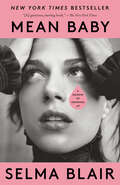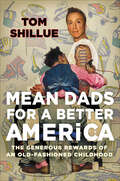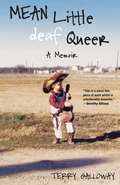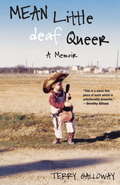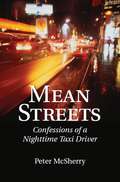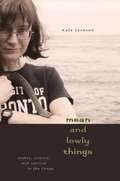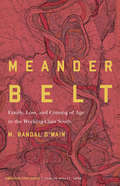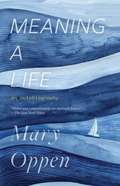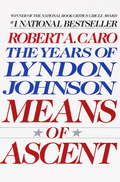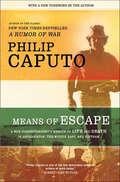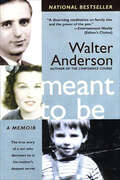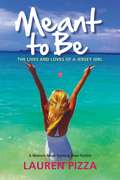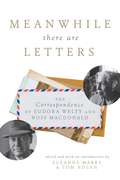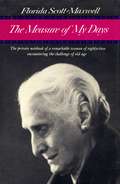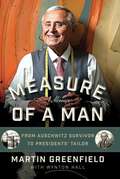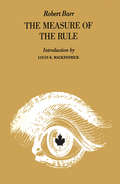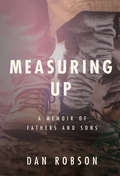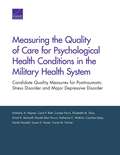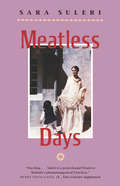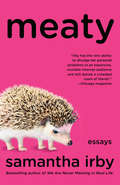- Table View
- List View
Mean Baby: A Memoir of Growing Up
by Selma BlairSelma Blair has played many roles: Ingenue in Cruel Intentions. Preppy ice queen in Legally Blonde. Muse to Karl Lagerfeld. Advocate for the multiple sclerosis community. But before all of that, Selma was known best as … a mean baby. In a memoir that is as wildly funny as it is emotionally shattering, Blair tells the captivating story of growing up and finding her truth. <p><p> The first story Selma Blair Beitner ever heard about herself is that she was a mean, mean baby. With her mouth pulled in a perpetual snarl and a head so furry it had to be rubbed to make way for her forehead, Selma spent years living up to her terrible reputation: biting her sisters, lying spontaneously, getting drunk from Passover wine at the age of seven, and behaving dramatically so that she would be the center of attention. <p><p>Although Selma went on to become a celebrated Hollywood actress and model, she could never quite shake the periods of darkness that overtook her, the certainty that there was a great mystery at the heart of her life. She often felt like her arms might be on fire, a sensation not unlike electric shocks, and she secretly drank to escape. <p><p>Over the course of this beautiful and, at times, devasting memoir, Selma lays bare her addiction to alcohol, her devotion to her brilliant and complicated mother, and the moments she flirted with death. There is brutal violence, passionate love, true friendship, the gift of motherhood, and, finally, the surprising salvation of a multiple sclerosis diagnosis. In a voice that is powerfully original, fiercely intelligent, and full of hard-won wisdom, Selma Blair’s Mean Baby is a deeply human memoir and a true literary achievement. <p> <b>New York Times Bestseller</b>
Mean Dads for a Better America: The Generous Rewards of an Old-Fashioned Childhood
by Tom ShillueAs a comedian and conservative thinker, whip-smart funny Tom Shillue grounds his ideas about our current culture and political climate in stories from his childhood — a portrait of growing up in 1970s America. Growing up as one of five kids in a devout Irish Catholic family in a small town outside of Boston, Tom sincerely believes that the rough-and-tumble, rules-dominated world in which he came of age was a better America—a time and place that made him into the well-adjusted, happy, successful man he is today. In Mean Dads for a Better America, Tom reminisces about his childhood, his family, and the traditional values he cherishes. He takes us back to a time when neighbors disciplined each other’s children without fear of being sued, when kids made it to the family table for dinner, when parents’ rules were gospel, when the occasional fistfight was considered a fair way to solve a problem, and when children were free to roam, make mistakes, and experience the first tastes of independence. Tom debates, debunks, and entertains with his hilarious approach to issues of the day, tackling the issues that confound many Americans, like our hypersensitive culture and overzealous parenting. As Tom celebrates the stability of family life and the sanity of days gone by, he encourages us to hold on to our sense of humor and look back at our own lives, as we work towards creating a better future for ourselves and our kids, all while making us laugh.
Mean Little Deaf Queer: A Memoir
by Terry GallowayIn 1959, the year Terry Galloway turned nine, the voices of everyone she loved began to disappear. No one yet knew that an experimental antibiotic given to her mother had wreaked havoc on her fetal nervous system, eventually causing her to go deaf. As a self-proclaimed "child freak," she acted out her fury with her boxy hearing aids and Coke-bottle glasses by faking her own drowning at a camp for crippled children. Ever since that first real-life performance, Galloway has used theater, whether onstage or off, to defy and transcend her reality. With disarming candor, she writes about her mental breakdowns, her queer identity, and living in a silent, quirky world populated by unforgettable characters. What could have been a bitter litany of complaint is instead an unexpectedly hilarious and affecting take on life.
Mean Little deaf Queer: A Memoir
by Terry GallowayIn 1959, the year Terry Galloway turned nine, the voices of everyone she loved began to disappear. No one yet knew that an experimental antibiotic given to her mother had wreaked havoc on her fetal nervous system, eventually causing her to go deaf. As a self-proclaimed "child freak," she acted out her fury with her boxy hearing aids and Coke-bottle glasses by faking her own drowning at a camp for crippled children. Ever since that first real-life performance, Galloway has used theater, whether onstage or off, to defy and transcend her reality. With disarming candor, she writes about her mental breakdowns, her queer identity, and living in a silent, quirky world populated by unforgettable characters. What could have been a bitter litany of complaint is instead an unexpectedly hilarious and affecting take on life.
Mean Streets: Confessions of a Nighttime Taxi Driver
by Peter McsherryShort-listed for the 2003 Edna Staebler Award for Creative Non-Fiction A world exists on the nighttime streets that the average person cannot envision. Taxi driver Peter McSherry recounts tales of his thirty years of experience driving cabs at night on the hard-bitten streets of Canada’s largest city. Drunks, punks, con artists, hookers, pimps, drug addicts, drug pushers, thugs, nymphomaniacs, snakes, politicians, celebrities . . . he’s experienced them all. McSherry serves up his stories with forthrightness, humour, and the occasional dash of cynicism. In this well-written and street-smart book, the author tells the rest of us about a world we can only imagine - if we dare.
Mean and Lowly Things: Snakes, Science, and Survival in the Congo
by Kate JacksonIn 2005 Kate Jackson ventured into the remote swamp forests of the northern Congo to collect reptiles and amphibians. Her camping equipment was rudimentary, her knowledge of Congolese customs even more so. She knew how to string a net and set a pitfall trap, but she never imagined the physical and cultural difficulties that awaited her. Culled from the mud-spattered pages of her journals, Mean and Lowly Things reads like a fast-paced adventure story. It is Jackson’s unvarnished account of her research on the front lines of the global biodiversity crisis—coping with interminable delays in obtaining permits, learning to outrun advancing army ants, subsisting on a diet of Spam and manioc, and ultimately falling in love with the strangely beautiful flooded forest. The reptile fauna of the Republic of Congo was all but undescribed, and Jackson’s mission was to carry out the most basic study of the amphibians and reptiles of the swamp forest: to create a simple list of the species that exist there—a crucial first step toward efforts to protect them. When the snakes evaded her carefully set traps, Jackson enlisted people from the villages to bring her specimens. She trained her guide to tag frogs and skinks and to fix them in formalin. As her expensive camera rusted and her Western soap melted, Jackson learned what it took to swim with the snakes—and that there’s a right way and a wrong way to get a baby cobra out of a bottle.
Meander Belt: Family, Loss, and Coming of Age in the Working-Class South (American Lives)
by M. Randal O'WainIn Meander Belt M. Randal O’Wain offers a reflection on how a working-class boy from Memphis, Tennessee, came to fall in love with language, reading, writing, and the larger world outside of the American South. This memoir examines what it means for the son of a carpenter to value mental rather than physical labor and what this does to his relationship with his family, whose livelihood and sensibility are decidedly blue collar. Straining the father-son bond further, O’Wain leaves home to find a life outside Memphis, roaming from place to place, finding odd jobs, and touring with his band. From memory and observation, O’Wain assembles a subtle and spare portrait of his roots, family, and ultimately discovers that his working-class upbringing is not so antithetical to the man he has become.
Meaning a Life: An Autobiography
by Mary OppenA classic of twentieth-century American autobiography now back in print with previously unpublished material from the author’s archive First published in 1978, Mary Oppen’s seminal Meaning a Life has been largely unavailable for decades. Written in her sixties, her first and only prose book recounts, with honesty, depth, and conviction, her fiercely independent life—“a twentieth-century American romance,” as Yang describes it in the new introduction, “of consciousness on the open road; a book of travel where the autobiographer is not the usual singular self at the center of the story but the union of two individuals.” Oppen tells the story of growing up with three brothers in the frontier towns of Kalispell, Montana, and Grants Pass, Oregon, determined to escape the trap of “a meaningless life with birth and death in a biological repetition.” That escape happens in the fall of 1926, when she meets another student in her college poetry class, George Oppen. She is expelled for breaking curfew, and from then on the two face the world intertwined: living a life of conversation, hitchhiking across the US, sailing from the Great Lakes to New York City, meeting fellow poets and artists, starting a small press with Zukofsky and Pound, traveling by horse and cart through France, and fighting fascism through the Great Depression. Mary Oppen writes movingly of both her inner life and external events, of the inconsolable pain of suffering multiple stillbirths, of her husband fighting on the front lines during WWII while she struggled to care for their baby daughter, of fleeing to Mexico to avoid persecution for their political activities. This expanded edition includes a new section of prose and poetry that deepens Oppen’s radiantly incisive memoir with further memories, travels, and reflections.
Means of Ascent: The Years of Lyndon Johnson II (The Years of Lyndon Johnson #2)
by Robert A. CaroRobert A. Caro's life of Lyndon Johnson, which began with the greatly acclaimed The Path to Power, also winner of the National Book Critics Circle Award, continues -- one of the richest, most intensive and most revealing examinations ever undertaken of an American President. In Means of Ascent the Pulitzer Prize-winning biographer/historian, chronicler also of Robert Moses in The Power Broker, carries Johnson through his service in World War II and the foundation of his long-concealed fortune and the facts behind the myths he created about it. But the explosive heart of the book is Caro's revelation of the true story of the fiercely contested 1948 senatorial election, for forty years shrouded in rumor, which Johnson had to win or face certain political death, and which he did win -- by "the 87 votes that changed history." Caro makes us witness to a momentous turning point in American politics: the tragic last stand of the old politics versus the new -- the politics of issue versus the politics of image, mass manipulation, money and electronic dazzle.From the Trade Paperback edition.
Means of Escape: A War Correspondent's Memoir of Life and Death in Afghanistan, the Middle East, and Vietnam
by Philip Caputo"A riveting memoir of years of living dangerously."—Kirkus ReviewsFor the countless readers who have admired Philip Caputo's classic memoir of Vietnam, A Rumor of War, here is his powerful recounting of his life and adventures, updated with a foreword that assesses the state of the world and the journalist's art. As a journalist, Caputo has covered many of the world's troubles, and in Means of Escape, he tells the reader in moving and clear-eyed prose how he made himself into a writer, traveler, and observer with the nerve to put himself at the center of the world's conflicts. As a young reporter he investigated the Mafia in Chicago, earning acclaim as well as threats against his safety. Later, he rode camels through the desert and enjoyed Bedouin hospitality, was kidnapped and held captive by Islamic extremists, and was targeted and hit by sniper fire in Beirut, with memories of Vietnam never far from the surface. And after it all, he went into Afghanistan. Caputo's goal has always been to bear witness to the crimes, ambitions, fears, ferocities, and hopes of humanity. With Means of Escape, he has done so.
Meant To Be
by James G. VerityBorn in Brooklyn in 1925, James Verity, enters priesthood formation program at age 14. After almost 30 years, he leaves, but always he wants to serve God and man. Powerful and beautiful.
Meant To Be: A Memoir
by Walter AndersonPublished to strong reviews and major media attention, this heartfelt and inspirational rags-to-riches memoir by the highly regarded CEO of Parade Publications tells the emotional story of how he came to terms with an identity and a family that he never knew he had until he reached middle age.Meant To Be begins when Anderson, a 21-year-old Marine returns from service to say goodbye to his dying father and tries to find the answer to a question that has inexplicably haunted him from his earliest years: Was the alcoholic, abusive man who has so tormented him in his childhood his real father? Shockingly, the answer turns out to be "No." Unbeknown to him, at least until that point, his mother, a German Protestant, fell in love during World War II with a Russian Jew and bore his child. Anderson learns this information as a young man but he and his mother keep this secret for another 35 years, until the day Anderson—now an unusually successful publishing executive—meets an unknown brother who, it turns out, has lived a nearly parallel life. Meant To Be is a love story, a journey of self-discovery and spirituality, and a provocative challenge to common notions about the role of heredity in our lives.
Meant to Be
by E. H. WilliamsHistory unravels such irony. During World War II, a dutiful son wearing an American soldier&’s uniform sat in a detention camp across the table from his father, a declared enemy. The war later brought together two identified adversaries across a vast ocean. Governments may declare hostile parties, but humans cross those boundaries.
Meant to Be: The Lives and Loves of a Jersey Girl
by Lauren PizzaWhen Lauren Pizza was thirteen, she died. Caught under a small sailboat, she struggled to reach the surface, only to find that what she thought was up was actually down . . . and that's all she remembers. Ever since being resuscitated by two strangers, Pizza has felt a presence in her life from the spirit world. Is it crazy? Maybe. Her family sure thinks so. Growing up the youngest, and sometimes forgotten, of five in Little Falls, New Jersey, Pizza continues to live the typical life "down the shore" after her accident. She survives high school (barely), goes to college in Dayton, Ohio (which she might have thought was in Florida when she applied), and is ready to settle down with her "perfect" Kennedy-esque boyfriend in Jersey-until she wakes up.Suddenly free and single, Pizza relies on intuition (and perhaps a few signs) and finds herself a job in the city, a grungy apartment in the West Village, and waits for Prince Charming. When he finally arrives, she doesn't recognize him: he drives a red Ferrari, sure, but he has hair like Howard Stern and wears more gold chains than Mr. T. Meant to Be is the story of a blue-collar Jersey girl swept off her feet by an unconventional millionaire, thrust into an entirely new world, where she makes plenty of mistakes and sometimes feels like "I'm from the Jersey Shore" is stapled to her forehead.With humor, gratitude, and trademark Jersey spunk, Lauren tells it like it is: the highs, the lows, the bad twists, the good advice from unlikely places, and the times she wished she could disappear. Underneath the designer clothes and private jets, she's still the same Jersey Girl who took the D train and lived on Snapple. And she wouldn't have it any other way.
Meanwhile There Are Letters: The Correspondence of Eudora Welty and Ross Macdonald
by Suzanne Marrs Tom NolanIn 1970, Ross Macdonald wrote a letter to Eudora Welty, beginning a thirteen-year correspondence between fellow writers and kindred spirits. Though separated by background, geography, genre, and his marriage, the two authors shared their lives in witty, wry, tender, and at times profoundly romantic letters, each drawing on the other for inspiration, comfort, and strength. They brought their literary talents to bear on a wide range of topics, discussing each others' publications, the process of translating life into fiction, the nature of the writer’s block each encountered, books they were reading, and friends and colleagues they cherished. They also discussed the world around them, the Vietnam War, the Nixon, Carter, and Reagan presidencies, and the environmental threats facing the nation. The letters reveal the impact each had on the other’s work, and they show the personal support Welty provided when Alzheimer’s destroyed Macdonald’s ability to communicate and write. The editors of this collection, who are the definitive biographers of these two literary figures, have provided extensive commentary and an introduction. They also include Welty’s story fragment "Henry,” which addresses Macdonald’s disease. With its mixture of correspondence and narrative, Meanwhile There Are Letters provides a singular reading experience: a prose portrait of two remarkable artists and one unforgettable relationship.
Measure of My Days
by Florida Scott-MaxwellAt eighty-two, Florida Scott-Maxwell felt impelled to write about her strong reactions to being old, and to the time in which we live. Until almost the end this document was not intended for anyone to see, but the author finally decided that she wanted her thoughts and feelings to reach others. Mrs. Scott-Maxwell writes: "I was astonished to find how intensely one lives in one's eighties. The last years seemed a culmination and by concentrating on them one became more truly oneself. Though old, I felt full of potential life. It pulsed in me even as I was conscious of shrinking into a final form which it was my task and stimulus to complete." The territory of the old is not Scott-Maxwell's only concern. In taking the measure of the sum of her days as a woman of the twentieth century, she confronts some of the most disturbing conflicts of human nature--the need for differentiation as against equality, the recognition of the evil forces in our nature--and her insights are challenging and illuminating. The vision that emerges from her accumulated experience of life makes this a remarkable document that speaks to all ages.
Measure of a Man: From Auschwitz Survivor to Presidents' Tailor
by Wynton Hall Martin GreenfieldHe's been called "America's greatest living tailor" and "the most interesting man in the world." Now, for the first time, Holocaust survivor Martin Greenfield tells his incredible life story. Taken from his Czechoslovakian home at age fifteen and transported to the Nazi concentration camp at Auschwitz with his family, Greenfield came face to face with "Angel of Death" Dr. Joseph Mengele and was divided forever from his parents, sisters, and baby brother.In haunting, powerful prose, Greenfield remembers his desperation and fear as a teenager alone in the death camp-and how an SS soldier's shirt dramatically altered the course of his life. He learned how to sew; and when he began wearing the shirt under his prisoner uniform, he learned that clothes possess great power and could even help save his life.Measure of a Man is the story of a man who suffered unimaginable horror and emerged with a dream of success. From sweeping floors at a New York clothing factory to founding America's premier custom suit company, Greenfield built a fashion empire. Now 86 years old and working with his sons, Greenfield has dressed the famous and powerful of D.C. and Hollywood, including Presidents Dwight Eisenhower, Bill Clinton, and Barack Obama, celebrities Paul Newman, Leonardo DiCaprio, and Jimmy Fallon, and the stars of Martin Scorsese's films.Written with soul-baring honesty and, at times, a wry sense of humor, Measure of a Man is a memoir unlike any other-one that will inspire hope and renew faith in the resilience of man.
Measure of the Rule
by Robert Barr Douglas Lochhead Louise K. MackendrickRobert Barr has been almost completely overlooked by critics and anthologists of Canadian literature, in part because, although he was educated in Canada, he spent most of his life in the United States and England. However, since most of his serious novels are either set in Canada or have some Canadian connection, Barr deserves attention. The Measure of the Rule, originally published in 1907, is the nearest he came to writing an autobiographical novel. It concerns the Toronto Normal School and the experiences there in the 1870s of a young man who undoubtedly is Barr himself. In this novel, Barr is exorcising unhappy memories and is ironic, even bitter, about the school's quality of education, the rigid discipline observed by its staff and their indifference to their students, and the sexual segregation practiced. A number of men under whom Barr actually studied are vividly caricatured. As a realistic study of Ontario's only central teacher-training institution in the late nineteenth century, The Measure of the Rule will appeal both to those interested in Canadian fiction of that period and to those more concerned with the evolution of the system of education established by Egerton Ryerson. Also included with this reprint of the novel is an essay originally published in 1899 and entitled 'Literature in Canada.' In this essay, Barr elaborated upon his opinions of the school system and its quality of education.
Measuring Up: A Memoir of Fathers and Sons
by Dan Robson&“Dan Robson&’s book is a heart-wrenching portrait of grief. Anyone who has lost a parent will recognize it, know it intimately as you roll through the stages and finally come to the realization that a parent&’s ultimate gift to a child is showing them how to live.&”—Tanya Talaga, bestselling author of Seven Fallen Feathers A tender memoir of fathers and sons, love and loss, and learning to fill boots a size too big. Dan Robson&’s father is a builder, a fixer. A man whose high-school education is enough not only to provide for his family, but to build a successful business. Rick Robson holds things up. When he dies, nothing in his son&’s world feels steady anymore. In a very real sense, the home his father had built is suddenly fragile. Without its natural caretaker, the house will fall to pieces—and his family shows all the same signs of crumbling. Dan is hit especially hard. He knows he is not the man his father was. Dan never learned the blue-collar skills he admired, because his father wanted him to pursue his dream of becoming a writer. Now that his father is gone, the acknowledgment of his sacrifices and the sheer longing to be close to him again in some way draw Dan to the tools that lie unused in the garage. So begins Dan&’s year of learning the skills his father&’s hands had long mastered, and trying to fill the steel-toe boots left behind. Measuring Up is the story of that journey. Robson picks up where his father left off, working on the house and the truck, as much for the family as for himself. In much the same way that Michael Pollan comes to know his house inside-out in A Place of My Own, Robson learns the mysteries and proud satisfaction of plumbing, carpentry, wiring, and drywalling, and comes to understand how our homes are built. He also comes to see how his home was built by his father, uncovering more than one heartbreaking reminder of the kind of man his father was, and what he meant to his family. Tender and unflinching, Measuring Up is a story of love, mourning, and what it means to use your calloused hands to make the world around you a better place to live.
Measuring the Mosaic
by Rick Helmes-HayesMeasuring the Mosaic is a comprehensive intellectual biography of John Porter (1921-1979), author of The Vertical Mosaic (1965), preeminent Canadian sociologist of his time, and one of Canada's most celebrated scholars. In the first biography of this important figure, Rick Helmes-Hayes provides a detailed account of Porter's life and an in-depth assessment of his extensive writings on class, power, educational opportunity, social mobility, and democracy.While assessing Porter's place in the historical development of Canadian social science, Helmes-Hayes also examines the economic, social, political and scholarly circumstances - including the Depression, World War II, post-war reconstruction, the baby boom, and the growth of universities - that contoured Porter's political and academic views. Using extensive archival research, correspondence, and over fifty original interviews with family, colleagues, and friends, Measuring the Mosaic stresses Porter's remarkable contributions as a scholar, academic statesman, senior administrator at Carleton University, and engaged, practical public intellectual.
Measuring the Quality of Care for Psychological Health Conditions in the Military Health System: Candidate Quality Measures for Posttraumatic Stress Disorder and Major Depressive Disorder
by Elizabeth M. Sloss Susan D. Hosek Katherine E. Watkins Coreen Farris Harold Alan Pincus Carrie M. Farmer Caroline Epley Kimberly A. Hepner Carol P. Roth Grant R. Martsolf Daniel MandelTo inform improvements to the quality of care delivered by the military health system for posttraumatic stress disorder and major depressive disorder, researchers developed a framework and identified, developed, and described a candidate set of measures for monitoring, assessing, and improving the quality of care. This document describes their research approach and the measure sets that they identified.
Meatless Days
by Sara SuleriIn this finely wrought memoir of life in postcolonial Pakistan, Suleri intertwines the violent history of Pakistan's independence with her own most intimate memories--of her Welsh mother; of her Pakistani father, prominent political journalist Z. A. Suleri; of her tenacious grandmother Dadi and five siblings; and of her own passage to the West. "Nine autobiographical tales that move easily back and forth among Pakistan, Britain, and the United States. . . . She forays lightly into Pakistani history, and deeply into the history of her family and friends. . . . The Suleri women at home in Pakistan make this book sing. "--Daniel Wolfe,New York Times Book Review "A jewel of insight and beauty. . . . Suleri's voice has the same authority when she speaks about Pakistani politics as it does in her literary interludes. "--Rone Tempest, Los Angeles Times Book Review "The author has a gift for rendering her family with a few, deft strokes, turning them out as whole and complete as eggs. "--Anita Desai, Washington Post Book World "Meatless Daystakes the reader through a Third World that will surprise and confound him even as it records the author's similar perplexities while coming to terms with the West. Those voyages Suleri narrates in great strings of words and images so rich that they left this reader . . . hungering for more. "--Ron Grossman, Chicago Tribune "Dazzling. . . . Suleri is a postcolonial Proust to Rushdie's phantasmagorical Pynchon. "--Henry Louise Gates, Jr. ,Voice Literary Supplement
Meatless Days
by Sara SuleriIn this finely wrought memoir of life in postcolonial Pakistan, Suleri intertwines the violent history of Pakistan's independence with her own most intimate memories of her Welsh mother; of her Pakistani father, prominent political journalist Z. A. Suleri; of her tenacious grandmother Dadi and five siblings; and of her own passage to the West. "Nine autobiographical tales that move easily back and forth among Pakistan, Britain, and the United States. . . . She forays lightly into Pakistani history, and deeplyinto the history of her family and friends. . . . The Suleri women at home in Pakistan make this book sing. " Daniel Wolfe, "New York Times Book Review" "A jewel of insight and beauty. . . . Suleri's voice has the same authority when she speaks about Pakistani politics as it does in her literary interludes. " Rone Tempest, "Los Angeles Times Book Review" "The author has a gift for rendering her family with a few, deft strokes, turning them out as whole and complete as eggs. " Anita Desai, "Washington Post Book World" ""Meatless Days" takes the reader through a Third World that will surprise and confound him even as it records the author's similar perplexities while coming to terms with the West. Those voyages Suleri narrates in great strings of words and images so rich that they left this reader . . . hungering for more. " Ron Grossman, "Chicago Tribune" "Dazzling. . . . Suleri is a postcolonial Proust to Rushdie's phantasmagorical Pynchon. " Henry Louise Gates, Jr. , "Voice Literary Supplement""
Meatless Days (Flamingo Ser.)
by Sara Suleri GoodyearIn this finely wrought memoir of life in postcolonial Pakistan, Suleri intertwines the violent history of Pakistan's independence with her own most intimate memories—of her Welsh mother; of her Pakistani father, prominent political journalist Z.A. Suleri; of her tenacious grandmother Dadi and five siblings; and of her own passage to the West. "Nine autobiographical tales that move easily back and forth among Pakistan, Britain, and the United States. . . . She forays lightly into Pakistani history, and deeply into the history of her family and friends. . . . The Suleri women at home in Pakistan make this book sing."—Daniel Wolfe, New York Times Book Review "A jewel of insight and beauty. . . . Suleri's voice has the same authority when she speaks about Pakistani politics as it does in her literary interludes."—Rone Tempest, Los Angeles Times Book Review "The author has a gift for rendering her family with a few, deft strokes, turning them out as whole and complete as eggs."—Anita Desai, Washington Post Book World "Meatless Days takes the reader through a Third World that will surprise and confound him even as it records the author's similar perplexities while coming to terms with the West. Those voyages Suleri narrates in great strings of words and images so rich that they left this reader . . . hungering for more."—Ron Grossman, Chicago Tribune "Dazzling. . . . Suleri is a postcolonial Proust to Rushdie's phantasmagorical Pynchon."—Henry Louise Gates, Jr., Voice Literary Supplement
Meaty: Essays
by Samantha IrbyAs a writer and performer, Samantha Irby is a force of nature. As the genius behind the hilarious blog BITCHES GOTTA EAT, she's your sharp-tongued best friend who can't help but tell it like it is. In her debut essay collection MEATY, Samantha Irby explodes onto the page with essays about laughing her way through her ridiculous life of failed relationships, taco feasts, bouts with Crohn's Disease, and more. Written with the same scathing wit and poignant bluntness long-time readers have come to expect from her riotous blog, MEATY takes on subjects both highbrow and low-from why she can't be mad at Lena Dunham, to the anguish of growing up with a sick mother, to how to prepare your disgusting meat carcass for some new, hot sex, to why she wants to write your mom's Match.com profile.
